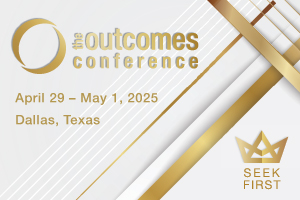
Church-Centric to Kingdom-Centric By Reggie McNeal

Understanding the Move from Church-Centric to Kingdom-Centric
A church-centric understanding of the church’s mission has blinded us to God’s mission, which he has been pursuing since the Garden. A church-centric orientation assumes that God is primarily concerned with looking after the church and how it gets along, shrinkwrapping God’s mission down to church size.
What is God’s real mission? It is for people to experience life as God intends. This includes not only our spiritual dimension but every aspect of our lives: physical, emotional, psychological, relational, and financial—the entire scope of human existence. Kingdom-centric means partnering with him to reclaim everything Hell has stolen!
We must move from our church-centric orientation to a kingdom-centric ministry agenda. This realignment requires a radical cultural transformation, entailing four non-negotiable changes. Each shift will require carefully constructed strategies to navigate the necessary transition successfully.
STORY
The first shift is the shift of the story.
Church leaders must ask themselves, “Are we telling a church-centric or kingdom-centric story?” In the first instance, the focus is on the church’s vision, offerings, and activities and why people want to be a part of this church among all the other competing options. It is customer-driven and has produced a church crowd of highly selective consumers of religious programming. The ensuing socialization often produces members who struggle to connect their church bubble experience with the concerns of their neighbors, their jobs, and the other dimensions of their lives.
On the other hand, a kingdom-biased story focuses on linking people to God’s epic mission, His story, helping people know how to position themselves to experience more of the life God intends for them. It celebrates human life transformation and offers people on-ramps to join God in his mission of improving the world around them.
SCORECARD
The second shift required to secure the move from a church-centric to a kingdom-centric ministry agenda is a change of scorecard.
The current church-as-institution scorecard celebrates member participation and activity, with church program success as its measure.
A kingdom scorecard measures progress in people’s development. In other words, it doesn’t register participation; it celebrates maturation. The fundamental question is: are people growing into the life God intends them to experience?
A kingdom-centric scorecard also assumes that the church should have a measurable impact on its community. Depending on the congregation’s community involvement, the scorecard could track any indices that should be positively impacted if the church saw its role as a servant to the community. The emphasis is on one result: more people living as God intended.
STEWARDSHIP
This brings us to the third shift the church must make to position itself for kingdom impact: its sense of stewardship.
This shift challenges the church-centric leadership agenda, where church leaders spend most of their time and energies on church activity—preparing sermons for church gatherings and attending to elements and items calibrated to ensure church program success. Instead of being disciples, their roles have been reduced to those of program developers and project managers to satisfy church consumers.
In a kingdom-centric understanding of the church’s mission, the church assumes responsibility for the community’s welfare. Kingdom-biased leadership efforts target the community’s needs. Examples might include hunger, homelessness, literacy, mental health, and child and family welfare.
STRUCTURE
A fourth shift essential to moving from church-centric to kingdom-centric ministry is structure.
We are at an inflection point in history. All modern institutions suffer a loss of trust and must be redefined and re-tooled to retain relevancy or survive. The church as an institution is not excluded from this challenge. It must assume new forms and expressions to connect with an emerging world shaped by the digital information revolution.
The good news is The Salvation Army’s mission statement embraces and reflects a kingdom-centric orientation. The challenge for today’s Army leadership is to recapture its roots as a movement squarely aimed at helping people experience life as God intends. Realigning its story, scorecard, stewardship, and structure to partner with God in his kingdom mission holds eternal promise.
####
Reggie McNeal is a Christian thought leader. For over 30 years, he has dedicated himself to helping everyday people and other leaders pursue more intentional lives. His professional experience is wide-ranging, from serving as a denominational executive, congregational leader, leadership coach, the founding pastor of a new church, and more. He has also lectured and taught as adjunct faculty for multiple seminaries, served as a church ministry consultant, and advised in the business sector.

Winter Term enrollment is open through January 13, 2025
Find a course to grow your competency and increase your leadership capacity!
LEARN MORE!




